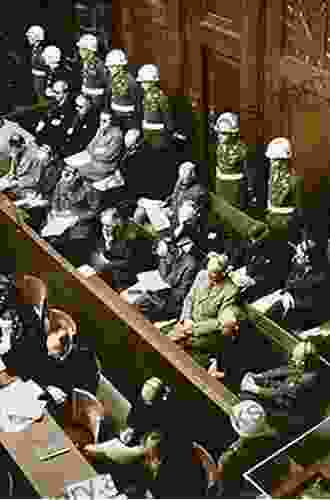Accountability for Human Rights Atrocities in International Law: A Comprehensive Guide

The concept of accountability for human rights atrocities has gained increasing prominence in international law over the past several decades. The atrocities committed during the Holocaust, the Rwandan genocide, and the Bosnian war, among others, have highlighted the need for effective mechanisms to hold individuals responsible for such heinous crimes.
5 out of 5
| Language | : | English |
| File size | : | 3026 KB |
| Text-to-Speech | : | Enabled |
| Enhanced typesetting | : | Enabled |
| Word Wise | : | Enabled |
| Print length | : | 528 pages |
| Lending | : | Enabled |
| Screen Reader | : | Supported |
| X-Ray for textbooks | : | Enabled |
This book provides a comprehensive analysis of the legal framework for holding individuals accountable for human rights atrocities in international law. It examines the various mechanisms for accountability, including international criminal tribunals, national courts, and universal jurisdiction, and discusses the challenges and opportunities for ensuring justice for victims.
Mechanisms for Accountability
There are a number of different mechanisms for holding individuals accountable for human rights atrocities in international law. These mechanisms include:
- International criminal tribunals: These are ad hoc tribunals established by the United Nations Security Council to prosecute individuals accused of committing war crimes, crimes against humanity, and genocide. Examples of international criminal tribunals include the International Criminal Tribunal for the Former Yugoslavia (ICTY),the International Criminal Tribunal for Rwanda (ICTR),and the International Criminal Court (ICC).
- National courts: National courts have jurisdiction to prosecute individuals for human rights atrocities committed within their territory or against their own nationals. In recent years, there has been a growing trend towards national courts exercising universal jurisdiction over human rights atrocities, even if the crimes were committed in other countries.
- Universal jurisdiction: Universal jurisdiction is the principle that certain crimes, such as war crimes, crimes against humanity, and genocide, are so serious that they can be prosecuted by any state, regardless of where the crimes were committed or the nationality of the accused.
Challenges and Opportunities
There are a number of challenges to ensuring accountability for human rights atrocities in international law. These challenges include:
- Political interference: Political considerations can often interfere with the pursuit of justice for human rights atrocities. States may be reluctant to prosecute their own nationals or allies, or they may use the prosecution of human rights atrocities to advance their own political agendas.
- Lack of cooperation: States may be unwilling to cooperate with international criminal tribunals or national courts that are investigating or prosecuting human rights atrocities. This lack of cooperation can make it difficult to gather evidence and apprehend suspects.
- Witness intimidation: Witnesses to human rights atrocities are often intimidated or threatened, which can make it difficult to obtain their testimony. This intimidation can also create a climate of fear and silence that makes it difficult to investigate and prosecute human rights atrocities.
Despite these challenges, there are also a number of opportunities for ensuring accountability for human rights atrocities in international law. These opportunities include:
- The growing international consensus on the importance of accountability: There is a growing consensus among states that human rights atrocities must not go unpunished. This consensus has led to the establishment of international criminal tribunals and the adoption of national laws that implement universal jurisdiction.
- The increasing role of civil society organizations: Civil society organizations play a vital role in documenting human rights atrocities, providing support to victims, and advocating for accountability. These organizations can help to pressure states to investigate and prosecute human rights atrocities, and they can also provide evidence and support to international criminal tribunals and national courts.
- The development of new technologies: New technologies, such as satellite imagery and social media, can be used to gather evidence of human rights atrocities and to identify suspects. These technologies can help to overcome the challenges of political interference and lack of cooperation.
The pursuit of accountability for human rights atrocities is a complex and challenging task. However, the international community has made significant progress in recent years in developing the legal framework and mechanisms for holding individuals responsible for these crimes. There are still challenges to overcome, but the growing consensus on the importance of accountability and the increasing role of civil society organizations and new technologies provide hope for a future in which human rights atrocities are no longer tolerated.
5 out of 5
| Language | : | English |
| File size | : | 3026 KB |
| Text-to-Speech | : | Enabled |
| Enhanced typesetting | : | Enabled |
| Word Wise | : | Enabled |
| Print length | : | 528 pages |
| Lending | : | Enabled |
| Screen Reader | : | Supported |
| X-Ray for textbooks | : | Enabled |
Do you want to contribute by writing guest posts on this blog?
Please contact us and send us a resume of previous articles that you have written.
 Book
Book Novel
Novel Page
Page Chapter
Chapter Text
Text Story
Story Genre
Genre Reader
Reader Library
Library Paperback
Paperback E-book
E-book Magazine
Magazine Newspaper
Newspaper Paragraph
Paragraph Sentence
Sentence Bookmark
Bookmark Shelf
Shelf Glossary
Glossary Bibliography
Bibliography Foreword
Foreword Preface
Preface Synopsis
Synopsis Annotation
Annotation Footnote
Footnote Manuscript
Manuscript Scroll
Scroll Codex
Codex Tome
Tome Bestseller
Bestseller Classics
Classics Library card
Library card Narrative
Narrative Biography
Biography Autobiography
Autobiography Memoir
Memoir Reference
Reference Encyclopedia
Encyclopedia John Scura
John Scura Mary Gibson
Mary Gibson Jonathan Marks
Jonathan Marks Richard Brady
Richard Brady Margaret A Majumdar
Margaret A Majumdar Michael A Scaddan
Michael A Scaddan John Bunyan
John Bunyan Judith Martinovich
Judith Martinovich Paula Danciu
Paula Danciu Wilbur Smith
Wilbur Smith Kevin Ure
Kevin Ure Jonathan Spyer
Jonathan Spyer Marianne Sunderland
Marianne Sunderland John L Dornhoffer
John L Dornhoffer Windra Swastika
Windra Swastika John Keats
John Keats Sheila Scobba Banning
Sheila Scobba Banning John H Cunningham
John H Cunningham Mike Lee
Mike Lee Samuel E Abrams
Samuel E Abrams
Light bulbAdvertise smarter! Our strategic ad space ensures maximum exposure. Reserve your spot today!

 Thomas PynchonUnravel the Secrets of Life and Death on Contested Island: A Literary Voyage
Thomas PynchonUnravel the Secrets of Life and Death on Contested Island: A Literary Voyage
 Caleb LongWhy Republicans Need to Embrace American Ideals and Why They Deserve to Fail...
Caleb LongWhy Republicans Need to Embrace American Ideals and Why They Deserve to Fail...
 Ryan FosterThe Unintended Consequences of Political Correctness: The New Reality of Race...
Ryan FosterThe Unintended Consequences of Political Correctness: The New Reality of Race... Ralph TurnerFollow ·2.5k
Ralph TurnerFollow ·2.5k Robin PowellFollow ·18k
Robin PowellFollow ·18k Ernest PowellFollow ·2.7k
Ernest PowellFollow ·2.7k Bob CooperFollow ·6k
Bob CooperFollow ·6k Gil TurnerFollow ·4.4k
Gil TurnerFollow ·4.4k Esteban CoxFollow ·18.5k
Esteban CoxFollow ·18.5k Francisco CoxFollow ·11.4k
Francisco CoxFollow ·11.4k Joel MitchellFollow ·5.2k
Joel MitchellFollow ·5.2k

 Tyler Nelson
Tyler NelsonHer Dragon to Slay: Embark on an Epic Journey of...
In a realm where shadows dance and legends...

 Zachary Cox
Zachary Cox101 Best Marine Invertebrates: The Adventurous Aquarist's...
Unveiling the Enchanting Realm...

 William Wordsworth
William WordsworthHer Dragon Fire: Unleash the Power Within Your Soul
Embark on an...

 William Powell
William PowellUnveiling the Enchanting World of Machine Embroidery with...
Embroidery, an ancient art form that has...

 Will Ward
Will WardGolden Fire Clan Dragon Guard: A Journey into a Realm of...
Prepare to be...

 Gustavo Cox
Gustavo CoxProject Ideas to Elevate Your Hobbies and Flourish Your...
<p>Welcome to the ultimate guide to...
5 out of 5
| Language | : | English |
| File size | : | 3026 KB |
| Text-to-Speech | : | Enabled |
| Enhanced typesetting | : | Enabled |
| Word Wise | : | Enabled |
| Print length | : | 528 pages |
| Lending | : | Enabled |
| Screen Reader | : | Supported |
| X-Ray for textbooks | : | Enabled |






